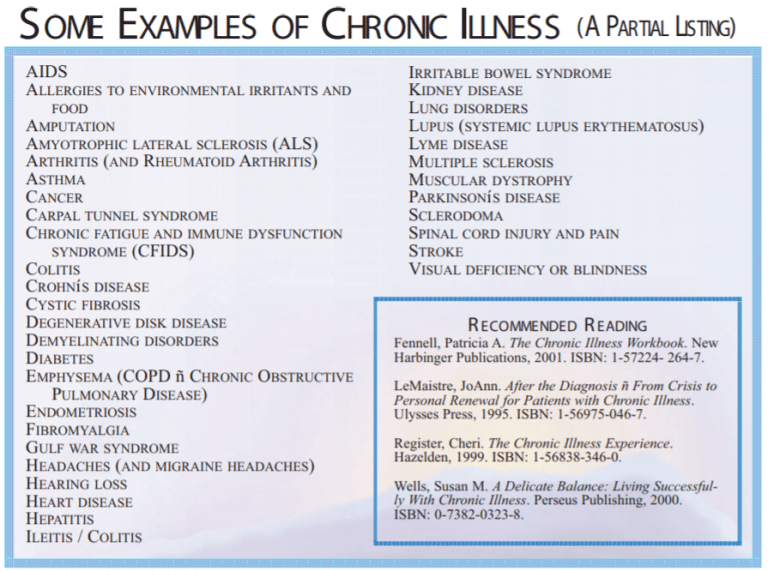
The disabled often say that those who are able-bodied are just temporarily so, that most of us at some point in our lives will suffer from some form of physical disability. Many of us believe in the adage that states that if you’ve got your health, you’ve got everything. However, unexpected health changes can happen to any of us. As our health status changes, our lives can continue to be rich and full while being different.
Our lifespans have increased enormously over the past century. Most of us will live into our seventies, eighties or longer. However, the rise in longevity that most of us can expect brings with it the increased probability that we will suffer from one or more physical diseases during our lifetimes. The incidence of heart disease, stroke, and cancer is high in Western societies. There is currently a diabetes epidemic that is associated with obesity due to diet and lack of exercise. Adults are more prone to develop diabetes, but an alarming number of children now experience type II diabetes. Many people develop immune- deficiency diseases such as lupus. These diseases are often an outcome of lifestyle choices. However, given the length of our lifespans, there is a high probability that a health crisis will come into our lives at some point.
A chronic illness is one that persists over time without an easily definable beginning, middle and end. While the suffering that accompanies a chronic illness can usually be alleviated to some extent, the illness itself is often not curable.
Our society and most health care professionals feel more comfortable in dealing with acute illnesses – diseases that can be treated and cured. This is easy to understand when we consider that society tends to value achievement and action. We prefer to deal with diseases that have a distinct cause, treat them with medication or other interventions, and then wait for the healing to begin. Chronic illnesses do not respond to such quick fixes. They are conditions that we must learn to live with – and lacking social support, the task of adapting to a chronic illness can be a major challenge.
Living with a chronic illness brings many issues to the forefront. One of the primary experiences of those with chronic illness is the trauma of realizing that their lives have changed, often permanently. Not only do they have to deal with the many changes that the illness will bring to their lifestyle and future, but they must also deal with the trauma the illness presents to their loved ones, friends and work associates. Other people fail to understand the disease and suddenly treat the sufferer in a different way – often through avoidance or superficial and uncomfortable support. The person with a chronic illness is sometimes seen as failing to contribute his or her fair share in a work setting. The disruption to families can cause severe conflict because it upsets the normal balance in family dynamics.
Phases of Adjustment to Chronic Illness-
Once patients are given the unwelcome news that they have a chronic physical illness, they must begin their individual adaptations to this new stage of their lives. Some struggle through each phase of their adjustment, and, in a way, compound their suffering. Others move through their adaptation more easily and go on to find a sense of wisdom and confidence – a fruitfulness of life experience that they may not have known prior to becoming ill. It is helpful to think of the following experiences as “phases” rather than “stages” since some features of the adjustment journey appear and reappear repeatedly for some people. These phases do not necessarily follow a linear path.
Remember that the goal of a person’s adjustment is to create a life that is as full and rich, although different than he or she experienced prior to becoming ill. Although this may seem at times to be an impossible goal, many have attained this objective. The objective for the person is to feel in control of the illness rather than the illness being in control of the person.
The Crisis Phase-
Learning that you have a new illness presents a situation of crisis and chaos. The most immediate response is to seek physical relief through medical intervention. Some people may seek a spiritual resolution to the crisis. Unfortunately, others may turn to alcohol or drugs. Learning that the crisis will continue in a chronic mode brings up feelings of anxiety about the future and the impact the illness will have from now on. You may have questions about your mortality and the meaning of your life – and because you may have never confronted these issues in the past, you may feel anxious as these issues arise.
With the onset of illness comes an urgency to find out as quickly as possible what the illness will mean to you. You may feel that you are being punished somehow or that you are to blame. You may have negative thoughts that race through your mind all the time and distract you from work and other activities in your daily life. You might have physical symptoms associated with your illness which frighten you, but, in addition, you may feel confused and not know what to do next.
The goal of the crisis phase is to bring it under control. Your physical crisis needs to be stabilized, and for this, you need the help of health care professionals, both for your physical and your emotional needs. You may have a decreased ability to respond to others at this point, so your energy should focus inward on physical needs. You also need to work on containing your anxiety. Work on staying relaxed and letting your energy go into healing. Turn your negative thinking into positive and calming thoughts. Trust that things will get better – because they probably will. This is not the end of the world, but only the beginning of a new and different future with all sorts of exciting possibilities. Learn to use the supportive help from other people that are available to you. Find strategies for dealing with the negative behavior that might come from your friends and family.
The Stabilization Phase –
Gradually the effects of the illness become apparent. The acute phase of the illness will diminish then, there is an awareness on everyone’s part that the illness is a chronic one and the symptoms will become more easily defined. You learn to live with the symptoms day by day. Family members may retreat into themselves more because this has been an exhausting experience for everyone and they realize that life may never be quite the same again. They need time to regroup. The friends who may have been so available at first may not have the same degree of contact any longer – but this is not because they care less. Friends may simply not know how to react, or their emotional resources have been exhausted – and this might cause them to avoid the situation. You may feel isolated at this point and upset that the support you had before is no longer available. You may want desperately to find a cure because you don’t want this to be a permanent condition.
The goal of the stabilization phase is to focus on restructuring your life. You need to make a conscious decision to lead a very structured daily life in which you are aware of what you need to do. You start by paying attention to small tasks – getting up, getting dressed, taking care of business. You force yourself to get out of bed and to stop thinking negatively. You learn more clearly what your physical abilities are and make the best use of them. It is preferable to not overexert yourself at this point, but instead to test the limits of what you are able to do. You reflect on where you have been in life and what you need to do now in order to live a more productive life. You learn who your true friends are and where to find nurturing support. At this point, it may be helpful to learn to express your needs assertively, but not demanding, to those who are there for you.
The Reconstruction Phase –
This phase involves finally coming to terms with the permanence of your illness. You begin to realize what your abilities and limitations are. You understand that you are no longer able to live the way you did before the illness. During this phase, you may push yourself too hard because of your confidence that you are getting better. This may cause a relapse and a feeling of discouragement. But you pick yourself up once more and test the limits of your abilities, perhaps again and again, until you finally develop a sharp awareness of what you can do.
This phase brings about a heightened sense of self-control. While you may still depend on your doctor or therapist, you become aware that your own decisions and actions determine how successful you will be in dealing with life’s issues. You begin to understand that your illness is not the focus of everything in your life. You had life problems before your illness and you will have similar problems during your illness – just like everybody else. You forgive those who were not there for you when you needed them by understanding that your illness was difficult for them to accept. Your self-esteem heightens as you begin to feel pride in the challenges you faced and overcame.
The goal of the reconstruction phase is to build a new sense of meaning in your life and a renewed sense of self. You become aware that there is hope after all. You come to terms with how to care for your physical needs, how far to push yourself, and what you can do in the world. You know that you are firmly in control of your life. You begin to develop a meaningful way of explaining your illness and answer important questions about your life. You have accepted the fact that your life has changed permanently. You help others – your partner, friends, family, work associates – to come to this acceptance, as well.
The Integration Phase –
The final phase is the culmination of the struggle that your chronic illness has brought into your life. You understand what you have been through and how you have grown from the experience. You now know that you are a much wiser and abler person than you were before your illness. You accept that you may backslide, especially when the symptoms appear, but you have the tools now to get yourself back on course. You have integrated your pre-crisis self into your current sense of self so that your life will be whole – and from that, you have a good sense of what your life means.
Little did you know when the chronic illness began that you were presented with a gift – a gift which could make your life enormously rich.
Additional Resources:
https://fvinstitute.com/attention-deficits-living-with-add-and-adhd
https://fvinstitute.com/a-regular-checkup-is-good-for-the-mind-as-well-as-the-body/
https://fvinstitute.com/are-selfies-a-sign-of-a-mental-disorder/
https://fvinstitute.com/dependent-personality-disorder-diagnosis-and-treatment/
https://fvinstitute.com/highly-sensitive-people-strengths/



